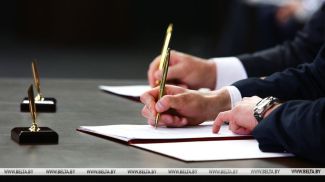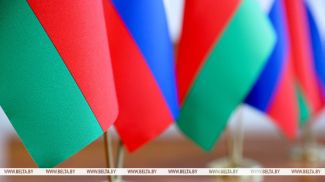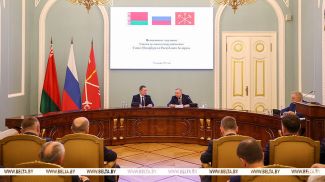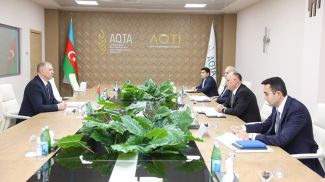MINSK, 14 June (BelTA) – Belarus offers a bridge between the continent's two largest markets and asks for stronger support of cooperation between the Eurasian Economic Union and the EU, Belarus' Deputy Minister of Foreign Affairs Oleg Kravchenko said in his speech during the 8th annual forum EU Strategy for the Baltic Sea Region (EUSBSR) which takes place in Berlin on 13-14 June, BelTA has learned.
“Belarus is an active promoter of connectivity in a broader context. As a stakeholder in both the Eurasian Economic Union and the Eastern Partnership, Belarus offers a bridge between the continent's two largest markets. We are convinced that “integrating integrations”, as we call it in Belarus, is part of the natural order of things in our region. We ask for stronger support of cooperation between the Eurasian Economic Union and the EU at least at the expert level. Considering the current difficulties in the EU, the instability and conflicts in the neighboring countries, it is in our common interest to make our region, the Baltic Sea region, the area of stability, prosperity and security,” Oleg Kravchenko said.
In his words, although Belarus does not have an access to the sea, the country has always been an active player in the Baltic. At present, when the processes of economic integration and regionalization are continually expanding, the region is becoming more and more important for Belarus. The European Union member states united by the EU Strategy for the Baltic Sea Region, namely Sweden, Denmark, Estonia, Finland, Germany, Latvia, Lithuania, and Poland are in the lead of the Belarus-EU trade and economic relations and represent a major driving force in the modernization of the Belarusian economy. They are also an important source of foreign direct investments for Belarus.
Oleg Kravchenko focused on the following thematic directions: transport and infrastructure connectivity, nature protection, and cooperation in the field of higher education. “All of them are of particular importance for Belarus and for the states of the Baltic Sea region. Connectivity is one of the highlights of our regional priorities. Belarus is a longtime transport and energy bridge between Europe's East and West, North and South. We are well-experienced with local and international connectivity solutions,” he said.
The deputy minister spoke about the ambition to restore the ancient waterway that used to span for centuries the Baltic Sea and the Black Sea via the rivers Dnieper, Pripyat, Vistula and onwards to Polish and German ports. “The corridor has the same strategic meaning for the region as the Danube for Central Europe. Its Belarusian and Ukrainian segments are already operational,” Oleg Kravchenko said.
In the same spirit, Belarus runs its 2017 presidency in the Central European Initiative (CEI) promoting connectivity in a Wider Europe. “The idea is to make the CEI member states better aware of and prepared for the changing regional transport and logistics setup, encourage an efficient response to related gains and risks and give this organization a louder voice in the ongoing continental debate. In our view, the CEI should remain a key partner of the European Union in the implementation of macro-regional strategies, including the EU Strategy for the Baltic Sea Region, and in promoting regional integration,” the deputy minister said.
He stressed that the launch of the One Belt, One Road project is complementary to Belarus' national “bridge-building” strategy in the Baltic. Since last year, Belarus and China have been implementing the joint One Belt, One Road roadmap. The Chinese-Belarusian Industrial Park Great Stone is the biggest Chinese manufacturing and logistics hub in Europe with possible outreach to Baltic and North Sea ports. “We are looking forward to discussing possible forms of mutually beneficial cooperation with administrations of the Antwerp and Zeebrugge sea terminals in Minsk later this year,” Oleg Kravchenko remarked.
Speaking about the role of Belarus in preserving the environment of the Baltic, he pointed out that the country has an effective history of cooperation with relevant regional structures and international financial institutions.
Besides, the unification of education standards and practices plays a crucial role in building regional synergies. “The acknowledgement of this fact resulted in launching the Bologna Process and establishing the European Higher Education Area (EHEA), which all our countries belong to. The Republic of Belarus is the youngest EHEA member. We are interested in a wider access to projects aimed at enhancing the mobility of students, teachers and researchers in the Baltic region,” the deputy minister said.













